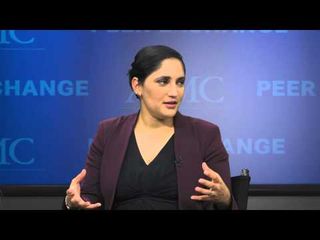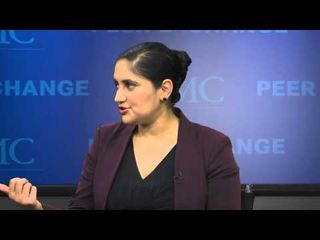
Oncology
Latest News
Latest Videos

CME Content
More News

This week in managed care, the top stories included discussions on biomarkers and financial toxicity at the annual meeting of the American Society of Clinical Oncology, and a preview of the 76th Scientific Sessions of the American Diabetes Association.

Results presented at the European League Against Rheumatism Annual Congress have confirmed that Systemic Lupus Erythematosus can increase the risk of developing cervical cancer in women.

The Colombian government is forcing pharmaceutical giant Novartis to lower prices of its leukemia medicine, imatinib (Gleevec).

Only half of US veterans who died from cancer received palliative care, while the use of hospice depended upon the care environment. Overall, there was a gap between the percentage of patients who received palliative care and recommended use.

A group in Israel presented a study that evaluated the price trend of 30 anticancer agents following their launch, and found that prices may increase by as much as 44% even after adjusting for inflation.

As cancer care stakeholders move through processes of creating, deploying, and reporting quality metrics, it is important to remember that these measures alone are not sufficient to bring better care to patients.

The German-Australian AML Study Group, one of the largest global groups evaluating treatments for acute myeloid leukemia (AML), has published results in the New England Journal of Medicine that now classifies AML into 11 classes based on the harbored genetic mutations.

A poster presented at the annual meeting of the American Society of Clinical Oncology (ASCO) found that the cost per median month of survival for daratumumab was lower compared with 2 other novel treatments in multiple myeloma.

The Department of Justice has announced that Genentech and OSI Pharmaceuticals “will pay $67 million to resolve False Claim Act allegations that they made misleading statements about the effectiveness of the drug Tarceva to treat non-small cell lung cancer.”

Many patients 65 years or younger are still receiving aggressive cancer treatment in their final months of life despite Choosing Wisely recommendations encouraging symptom-directed palliative care.

Can the Oncotype DX Breast Cancer Assay impact recommendation and receipt of chemotherapy in early stage breast cancer? Does the test also improve patient experience? These were some of the questions asked by researchers at the University of Michigan, and the results presented during the annual meeting of the American Society of Clinical Oncology.

What we're reading, June 7, 2016: opioid restrictions disproportionately affect older patients with chronic pain; Genentech and OSI Pharmaceuticals settle Tarceva lawsuit; and trouble raising Zika virus funds.

The American Society of Clinical Oncology’s first-ever clinical trial is growing with the addition of its seventh and eighth pharmaceutical companies, Bayer and Merck, and 30 additional trial participants.

With value frameworks still in their infancy, Michael Kolodziej, MD, national medical director for oncology strategy at Aetna, doesn't see how his company can use them just yet. In fact, these frameworks may never be used by insurers, but only for shared decision making between the patient and provider.

A session at the ongoing annual meeting of the American Society of Clinical Oncology (ASCO) provided an overview of ASCO's recently updated value framework and their quality program, the Quality Oncology Practice Initiative.

The first study sheds light on the complex interaction between underlying metabolic risk and breast cancer.

What we're reading, June 6, 2016: Vice President Joe Biden will announce the launch of an open-access cancer research database, and a new bill in Congress would allow companies to repurpose existing drugs for rare diseases.

While several clinical trials have tried to identify a programmed death-1 or programmed death ligand-1 expression—dependent response, it’s been an uphill task. During one of the sessions at the annual meeting of the American Society of Clinical Oncology, researchers were tasked with sharing their data on any breakthroughs or leads with biomarker-based treatment.

CancerCare provides oncology patients with many services that offer both educational and financial support as well as any help the patient may need with his or her family, such as child care and housekeeping needs. However, Patricia Goldsmith, CEO of CancerCare, explained that there are many financial challenges, including transportation and high out-of-pocket costs, that oncology patients continue to face.

The key to driving down costs, or at the very least making costs more predictable, is integrating pathways into the Oncology Care Model program, said John L. Fox, MD, MS, associate vice president of medical affairs at Priority Health.

Drug costs are a significant contributor to rising healthcare costs, along with the cost of healthcare services. How can providers and patients work together to find a solution to this problem?

During a session on the second day of the annual meeting of the American Society of Clinical Oncology, experts discussed treating patients with chimeric antigen receptor T cells (CAR-T cells).

Though Cigna’s reimbursement medical home model is still in its very early stages, Bhuvana Sagar, MD, national medical director of Cigna Healthcare, explained that discussing value in healthcare and getting back to smarter spending as well as better outcomes for patients should be the focus of all industry stakeholders.

New immunotherapies and biologics that are changing the landscape when it comes to treating patients are the most exciting development in oncology in the last year, according to Lucio Gordan, MD, of Florida Cancer Specialists.

As immunotherapy continues to show promise in solid as well as liquid tumors, clinicians have been evaluating these agents in combination. During a session on the second day of the ongoing annual meeting of the American Society of Clinical Oncology, in Chicago, IL, the results from some of these trials were shared.















